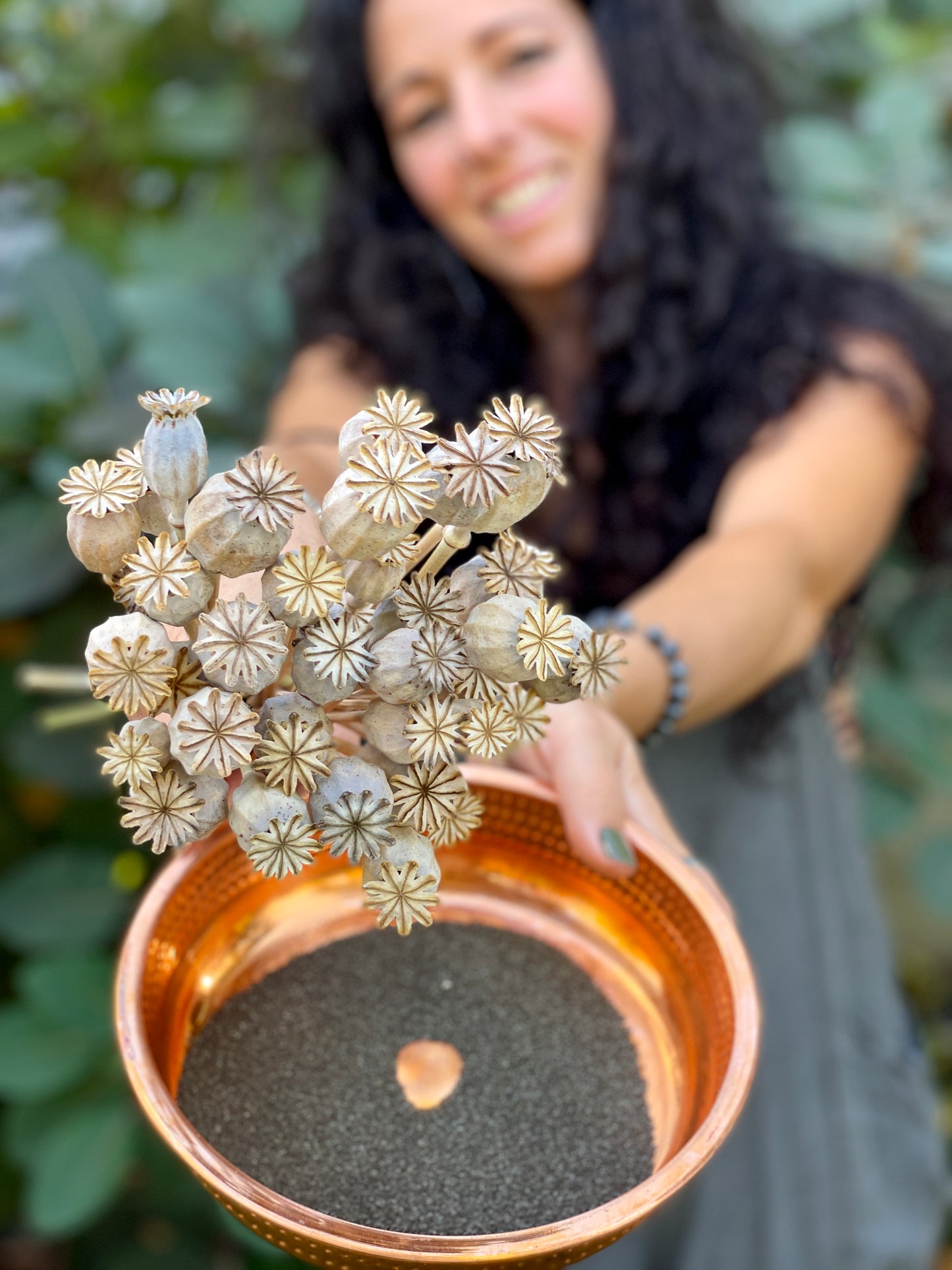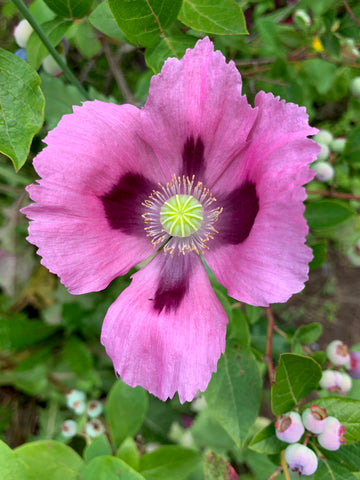

Growing breadseed poppies
Growing tips we’ve learned over the years:
Sow seeds generously in fall over well draining soil before your first frost & again in the spring before your last frost. Or, if you’re going garden stir crazy in the wintertime and snow is covering your garden, you can actually sow poppy seeds onto the snow and when the snow melts and the seeds come in contact with the soil, they will germinate at the correct time.
Miss the window for planting outdoors? No problem! You can cold treat (stratify) your seeds in the spring to create a false winter. Place seeds on a slightly moist (not wet) paper towel and cover with another layer of paper towel then place into a sealed plastic container (we repurpose to go containers for this) and pop seeds into the refrigerator for a few weeks and even put them into the freezer for a day or two before planting.
***Planting tip: You can also mix them with up slightly damp sand before planting to make the process of sowing these teeny tiny seeds even easier!
Be prepared to sow generously and then thin by cutting new sprouts until you have baby poppies growing every 6 inches. Poppies DO NOT like to be moved! They have sensitive tap roots that are not forgiving you if you attempt to relocate them.
*Often times you'll see little poppy seedling sprout and then they disappear the next day! It happens and it's frustrating, we've been there too! Be sure to check for slugs and snails around the growing area and under pots, they do love to dine on freshly sprouted seedlings!
Germination takes a few weeks & then watch the glorious poppy show unfold. Silvery lettuce like leaves grow up to 3 feet in height sending up multiple flower heads that bloom for a few days each, attracting beneficial pollinators like hoverflies & bees before swelling up to eventually become stunning, blueish grey seed heads. Wait a few more weeks for the heads to turn a tan hue & lift their crowns to expose the tiny vents.
We just added whimsical field poppies to our store! These self seed beautifully for a pop of red each spring and summer!
Seed Saving Tips:
Now the best part, seed pod and seed saving!
Gently cut the stem or allow it to dry in place and then pull the entire plant up out of the soil. Next, turn the heads upside down and collect the abundance! You can do this by gently turning them over onto a paper bag or harvest like us! There’s something so sweet about collecting seeds with our vintage Turkish Copper Bowl bowl! We commissioned friends in Turkey to create our very own copper bowl for so you can experience that same sacred ritual we enjoy with each seed harvest!
Aren't breadseed poppies illegal to grow?
Yes and no, depending on where you live, the variety of poppy you grow, and the amount you are growing. Officially, in America it's technically illegal to grow large amounts of breadseed poppies. However its generally accepted that officials will turn a blind eye if they happen to see an urban garden or backyard adorned by these beautiful blooms or magic seed pods as it is understood these breadseed poppies are intended for culinary and decorative purposes only.
The name ‘opium poppy’ is gradually becoming a misnomer as many of the varieties home gardeners grow have been bred for their nutritious and delicious seeds and do not contain a significant amount of the latex. Each breadseed poppy produces hundreds of tiny, bluish black, edible and delicious seeds used in culinary dishes throughout the world for thousands of years. Before these seeds form inside those gorgeous pods, the immature seed pods produce a latex/sap used to relieve pain and anxiety by slowing down the central nervous system. It can have a relaxing and calming effect on the mind and body and has been a medicinal plant used for thousands of years as a remedy for a variety of ailments. When used in proper and safe doses, it can be a form of natural medicine, that is why the pharmaceutical industry uses it to create both morphine and codeine.
Although the seeds themselves do not contain opiates, they are frequently contaminated with residue during harvesting which is why it’s actually possible to get a positive drug test after consuming a few poppy seed bagels! Depending on the methods of harvesting, unwashed poppy seeds may have trace amount of opioids on their seed coats when compared to washed poppy seeds. Individuals wishing to extract the alkaloid content from unwashed poppy seeds, use the seeds to create a tea. We do not encourage this practice nor do we practice this extraction as clearly seen in our poppy images and videos over the years.
Are the seeds safe to eat?
Breadseed poppies are the same as opium poppies, this is technically true, but it's not quite that simple, especially these days. Let's revisit the history of this medicinal plant to gain a better understanding of it today.
In ancient times poppies was grown and taken in measured doses as a relatively harmless medicine. It was enjoyed as a mood elevating ritualistic plant in many ancient eastern cultures. Sumerians referred to breadseed poppies as the ‘joy plant’ or ‘Gil Hul’ as early as 3000 B.C. Poppy seeds, poppy seed oil were infused into culinary and medicinal everyday life for centuries by the East, namely Turkey and India. By the 16th century India had a lucrative opium export industry, the Mongul empire had a monopoly, and eventually the British and East India Company involved themselves in the lucrative opium trade.
Around the end of the 17th century the Chinese discovered a new practice of smoking the poppy latex recreationally instead of ingesting the seeds, which, unfortunately led to a new kind of mass addiction. Demand for poppies soared and the Opium wars were the result. The legality and control over poppy production and trade between the Chinese Qing Dynasty, the East India Company and the Western powers (namely the UK and France). The 19th century brought about the new laws to control production and growth of poppies and the trade began its decline and went underground. Now breadseed poppies are banned in many countries as a result of the historical misuses.
Poppies and your Health
Poppy seeds are rich in fiber, healthy fats, and several micronutrients. In particular, they’re an excellent source of manganese and copper. Manganese is a trace element important for bone health and aids in blood clotting. This mineral also helps our bodies utilize amino acids, fats, and carbohydrates. Copper, is another important trace mineral needed to make connective tissue and aids in the transportation of iron within the blood.
Poppyseed oil is rich in mono- and polyunsaturated fats, known beneficials for heart, skin and hair health (wound healing properties)
Poppy seeds are ancient medicine weaving their way throughout human history. Historical and modern day uses include: soothing irritated throat, headache, asthma and digestive relief, as well as curing insomnia and boosting fertility in women who consume small amounts of poppy seed oil.
Poppy seeds are rich in linoleic acid making them an effective treatment for skin issues including itching, scalp irritation, burns and eczema.

Eating Poppy Seeds and Poppy Seed Oil
Poppy seeds are considered safe when consumed in small amounts as humans have done for thousands of years. We love infusing them into delicious salad dressing, sprinkling them on top of bread or adding them into various baked goods. Poppy seeds can be mashed to thicken lentil dishes and soups adding an extra bit of nutrition.
A common remedy for insomnia and headache include warmed milk infused with 1 tsp unwashed poppy seeds and 1 tsp honey.
Some of our favorite Poppy Seed Recipes:
https://www.thespruceeats.com/gluten-free-polish-poppy-seed-roll-1136698
https://www.smalltownwoman.com/creamy-poppy-seed-dressing/
https://www.allrecipes.com/recipe/220763/old-world-poppy-seed-roll/
https://homemadehome.com/lemon-almond-poppyseed-babka/
Happy growing dear friends!
with love,
Karina & Team SE











